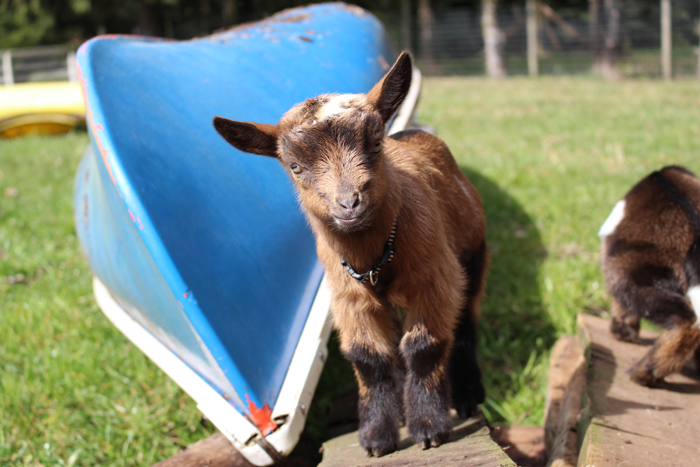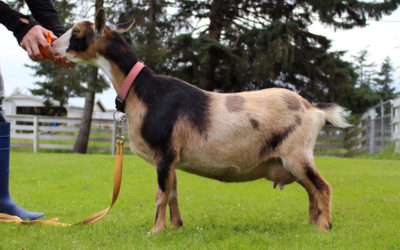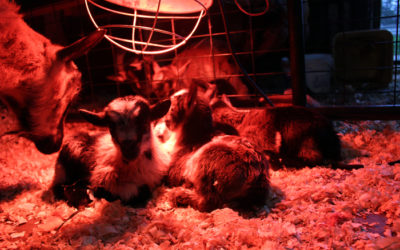There are three main aspects to caring for your new pets that you should consider. Hopefully you are reading this article before you have picked up your new goats so that you can be prepared; but if you haven’t this article should help you get started.
The main responsibilities for your goats that you now have as a goat owner are:
- food
- shelter
- routine health maintenance
Food
Goats are ruminents and as such their diet should consist almost entirely of vegetation: browse, forage, and roughage. As browsers, they naturally prefer to eat from shrubs, trees, and longer grass. The pasture length for your goats should be at least 6 inches high to reduce the incidence of internal parasites.
For wethers, it is of utmost importance to limit fattening treats in order to prevent them from becoming overweight, which can lead to a life-threatening condition called urinary calculi (caused by the formation of mineral deposits in the bladder). In addition to this, it is important to keep the calcium to phosphorus ratio of their diet at 2:1 for the prevention of urinary calculi. Appropriate treats for wethers can be cedar and fir branches, and the occasional slice of apple.
When choosing a pasture forage, a grass pasture is best and should provide well for their nutritional needs without being too high in protein and resulting in obesity. A legume pasture is higher in protein, but lower in carbohydrates (energy), and also can skew the calcium:phosphorus ratio and increase the risk of urinary calculi. You should also offer your goats a grass hay – a good quality hay is green and leafy and free of dust and mold. You should also offer your wethers a loose 2:1 mineral and salt. We recommend offering this free choice in small volume so that it stays fresh. Finally, make sure your wethers have access to fresh clean water at all times. They will not drink well from dirty buckets or soiled water. In cold weather, we like to give our goats warm water. In order to prevent urinary calculi, DO NOT feed your wethers grain or alfalfa or black oil sunflower seeds and be sure to offer plenty of clean fresh water to prevent dehydration.
Housing
There are various ways to house goats and an internet search can provide some fun inspiration for your goat’s shelter. Housing does not need to be fancy but it does need to be functional. It should protect your goats from weather extremes and conditions including drafts, damp and wet weather, snow, strong winds, extreme cold, and hot and humid weather. Good ventilation that is draft-free is important. Housing should be large enough to provide room for your goats to be active, which well help to prevent them from becoming overweight.
For bedding, you can use straw, pine shaving, bare dirt, or even just rubber mats, as long as your goats are standing on a dry floor. We like to keep our goats on a thick layer of straw with a layer of pine shavings underneath. The straw provides warmth and drainage and the shavings help to absorb moisture.
The enclosure for your goats should be made of good quality fencing that keeps your goats in and predators out. Goats are quite curious and are avid climbers so be sure to take that into consideration when choosing your fencing materials. The fencing should function to not only keep your goats in; but to keep predators out. Their indoor and outdoor spaces should be large enough that they can travel around throughout the day.
That being said, goats will benefit greatly from habitat enrichment that allows them to climb and explore and this mental stimulation is as important for them as their physical health. We like to provide platforms and tables for our goats to climb and rest on and strong bristle brushes mounted on the wall for them to scratch themselves on.
Routine Maintenance
As a pet goat owner you may be more comfortable with involving a veterinarian to help you oversee the general health of your goats and to help you if a goat is ailing. Some basic routine maintenance that you can do yourself are:
- Hoof trimming
- Vaccinations
- Body condition assessment
Hoofs should be trimmed every 6-8 weeks and the frequency necessary will vary from herd to herd. I recommend that you start by checking hoofs on a monthly basis until you establish how often trimming is required for your goats. A booster for Clostridium Types C and D and tetanus should be given every 6-12 months. We use Tas-Vax 8 for our goats; but there are other suitable vaccines available as well.
Sometimes issues arise like dental problems, high internal parasite loads, external parasites, and mineral deficiencies that can lead to a lack of thriftiness, weight loss, and anemia. Assess your goats’ body condition regularly so that you will know if something is amiss.





0 Comments